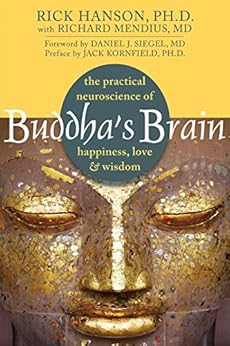Buddha's Brain delves into the neuroscience behind
stress, anxiety and depression while focusing on the effect meditative practice
has on the brain. The book is peppered with Buddhist quotes and some background
on Buddhism itself, but don't be fooled. This is not a religious book. It does
touch on spirituality, but the topic appears to come up mainly because
spiritual matters can have a profound effect on your mental health. Buddha and
Buddhism come up because Buddhist meditation is a proven method of relieving
stress and anxiety while increasing your overall sense of well-being.
Instead of giving you a review of Buddha's Brain,
I'm going to tell you what it has to offer for us anxious and/or depressed
folks. I found a lot of classic DBT and CBT methods mentioned in the book that
veteran patients will hopefully recognize, such as mindfulness and the benefits
of gratitude. I also found some valuable insights into dealing with painful
memories, making meditation more approachable, nurturing positive relationships
and so on. In short, both people who have sought help for years and people
first reaching out for help will find this book useful in their treatment and life in general.
What made my therapist think of me when she was
reading Buddha's Brain was the neuroscience component. She knows I prefer
science to spirituality (not that you can't have both). Hanson provides pages
of references for the assertions he makes regarding brain chemistry, memory
storage, etc. You know he's not just spouting the latest feel-good self-help
tropes, which I know a lot of you will appreciate.
Buddha's Brain provides everything you need to start
or supplement a meditation practice. If you don't want to meditate, it can help
you learn how to guide your thoughts so you can cultivate the wisdom that you
want in your life, strengthening those thoughts and hopefully weakening the hold negative thoughts have on you. It's not a magic cure for what ails you spiritually and mentally, but
rather a tool in the mental health toolbox you should always be expanding.
If you have any book suggestions you think I should check out, please let me know in the comments section.
If you have any book suggestions you think I should check out, please let me know in the comments section.

No comments:
Post a Comment